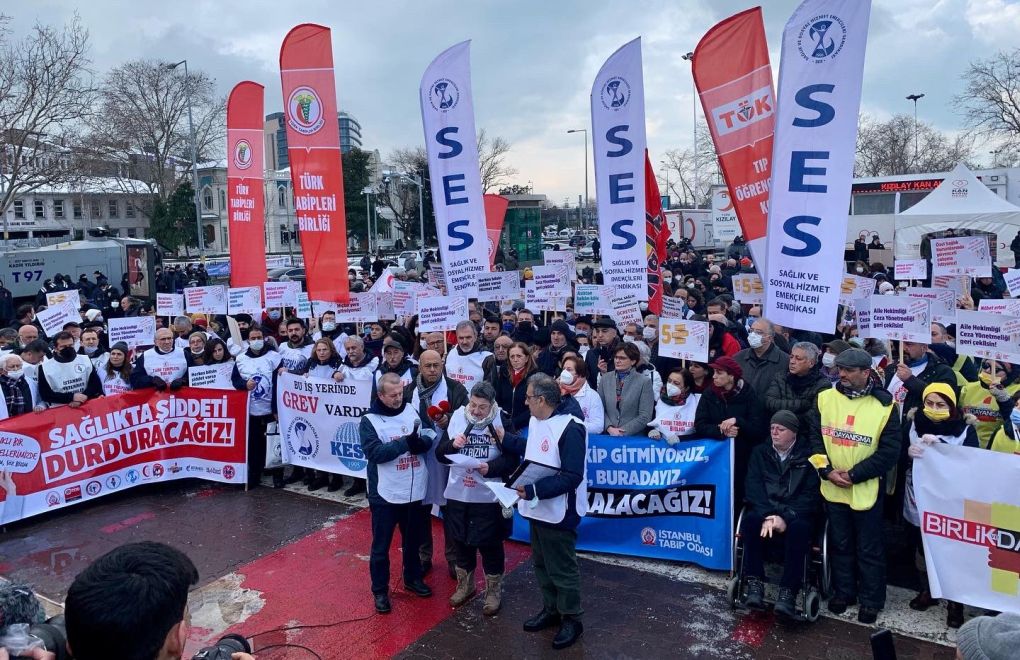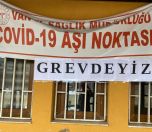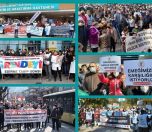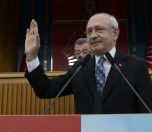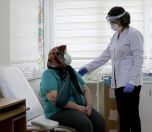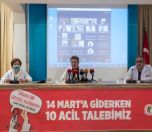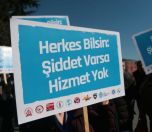* Photos: ETHA
Click to read the article in Turkish (1) (2)
Ahead of their two-day strike today and tomorrow (March 14-15), physicians and health workers held a protest in İstanbul's Kadıköy yesterday.
The protest was joined by the Turkish Medical Association (TTB), Health Laborers' Union (SES) İstanbul branches, İstanbul Medical Chamber, Turkish Dentists' Association İstanbul Branch, Turkish Pharmacists' Association İstanbul Branch, İstanbul Family Physicians Association, Turkish Veterinarians' Association İstanbul Branch, DİSK General Health and Social Service Union and Progressive Healthcare Workers Union.
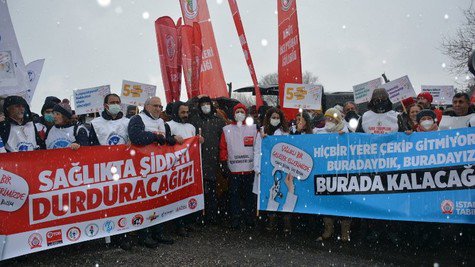
While the protest was also supported by opposition politicians, healthcare workers carried a banner that read, "We are not going anywhere, we will stay here", mostly in response to the remarks of President and ruling Justice and Development Party (AKP) Chair Recep Tayyip Erdoğan, who previously addressed the physicians in the following words:
"Are they off to work in the private sector in spite of this because they are paid much more? So be it, let them go.
"We will employ our newly graduated doctors here and carry on with them. We swiftly invite the ones who want to come back to Turkey from abroad, if needed. It will not remain empty around here, don't worry."
During their protest in Kadıköy, healthcare workers also opened banners that read, "We will stop violence in healthcare", "Everyone should know: If there is violence, there is no service", "We don't give up, we will get what is our right", "Withdraw the family medicine penalty regulation", "Assistant physicians are not slaves" and "We want paid leave the day after the shift".
'Minister didn't like our tone'
.jpg)
Addressing the crowd at the protest, TTB Central Council Chair Prof. Şebnem Korur Fincancı said that they have long been trying to make their voices heard about the problems they have been facing.
Recalling that they have been expressing their demands by holding marches, protests, vigils and strikes, TTB Chair Korur Fincancı also talked about the letter sent by Minister of Health Fahrettin Koca to physicians on the occasion of March 14 Doctor's Day in Turkey.
"I don't know what kind of a [Doctor's] Day message that is, but he said, 'The language and the tone in the attitude that we develop about our rights and requests should suit the nature of the profession," noted Prof. Korur Fincancı, accusing the Minister of "telling them how they should demand their rights and implying that they neglect their patients".
"He has apparently disliked our tone," she added.
Emphasizing that healthcare workers have been condemned to work for wages under the poverty line, Korur Fincancı said:
These conditions are equivalent to slavery conditions. Then, let's ask the ones who wrote us a letter and told us, 'I want you to believe that problems are not hard to overcome, that are problems to be easily overcome and the necessary efforts are being made': If it is not difficult, why have you not taken even a single step so far?
What did the Health Minister say in his letter?
Sending a letter to physicians ahead of March 14 Doctor's Day, Turkey's Health Minister Fahrettin Koca "extended his greetings and respects to his all friends who work as physicians under difficult conditions and try to fulfill the requirements of the profession on the one hand and think of how the medical service can be provided under better conditions on the other."
Noting that the COVID-19 pandemic "has shaken all societies in several respects", Health Minister Koca said that "regulations that are economically fair, which eliminate the cases of malpractice as a threat and that will increase the deterrence of violence are aimed for."
Acknowledging that several people from academics to students express concerns about the loss of prestige suffered by the medical profession, Fahrettin Koca recalled that "medical profession is one of the professions that provide people with status in society only through education".
Noting that "this status restricts [physicians] with customary practices", he has written, "For instance, the language and the tone in the attitude that we develop about our rights and requests should suit the nature of the profession. Because the nature of the profession entails observing patients as well." Further acknowledging that "working as a physician is hard in the country under the current conditions", Koca has said, "But I want you to believe that problems are not hard to overcome, they are problems to be easily overcome and necessary efforts are being made."
Concluding his letter to physicians, Health Minister Koca has expressed "the state's determination to do the best for them". (RT/SD)




